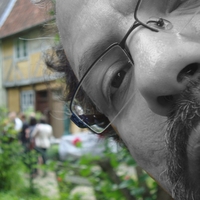
Simon Bayly
I am a teacher, writer and theatre-maker, currently working on Acts of Assembly, a research project exploring the meanings and functions of face-to-face meetings, gatherings and assemblies in an organisational culture saturated with virtual forms of communication.
less
Related Authors
Noel B. Salazar
KU Leuven
Galen Strawson
The University of Texas at Austin
E. Wayne Ross
University of British Columbia
John Barry
Queen's University Belfast
Andrea Peto
Central European University
Ruben López-Cano
Escola Superior de Música de Catalunya
David Seamon
Kansas State University
Freya Vass
University of Kent
Claire Bishop
Graduate Center of the City University of New York
Shaun Gallagher
University of Memphis
InterestsView All (27)










Uploads
Drafts by Simon Bayly
Papers by Simon Bayly
Bringing together a wide variety of source material drawn from theatre and performance studies, philosophy, psychology, and cultural studies, the early chapters explore the experience of audience as the audience of experience. They examine particular forms of theatrical appearing and spectatorship, notions of fiasco and disaster underpinning performance, and an ethics of theatrical experience. Shifting in scale from the macro to the micro level, these concerns are then focused around an engagement with the face as the prime figure of appearance, elaborated in the ethical philosophy of Emmanuel Lévinas and ‘disfigured’ in the garish symbol that stands for theatre – the masks of comedy and tragedy. The face and subsequently its oral/aural counterpart, the voice, are investigated via a logic of appearing or expression, a previously neglected and discredited concept. Expression is reanimated as an alternative to the tragic logic of representation. The anomalies of expression are explored via iconic images in artistic and scientific works deploying theatricalized presentations of human emotion, as well as via phenomenological consideration of other varieties of theatrical appearing, visual representation, everyday behaviour and non-linguistic utterance.